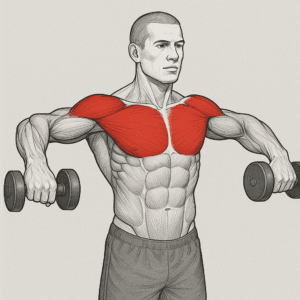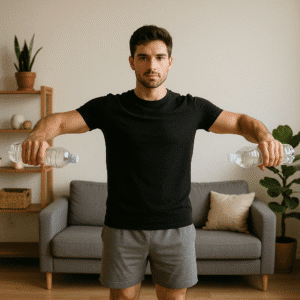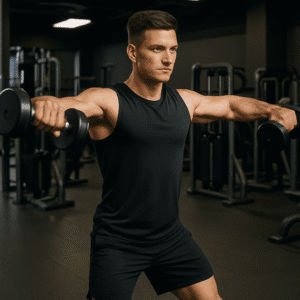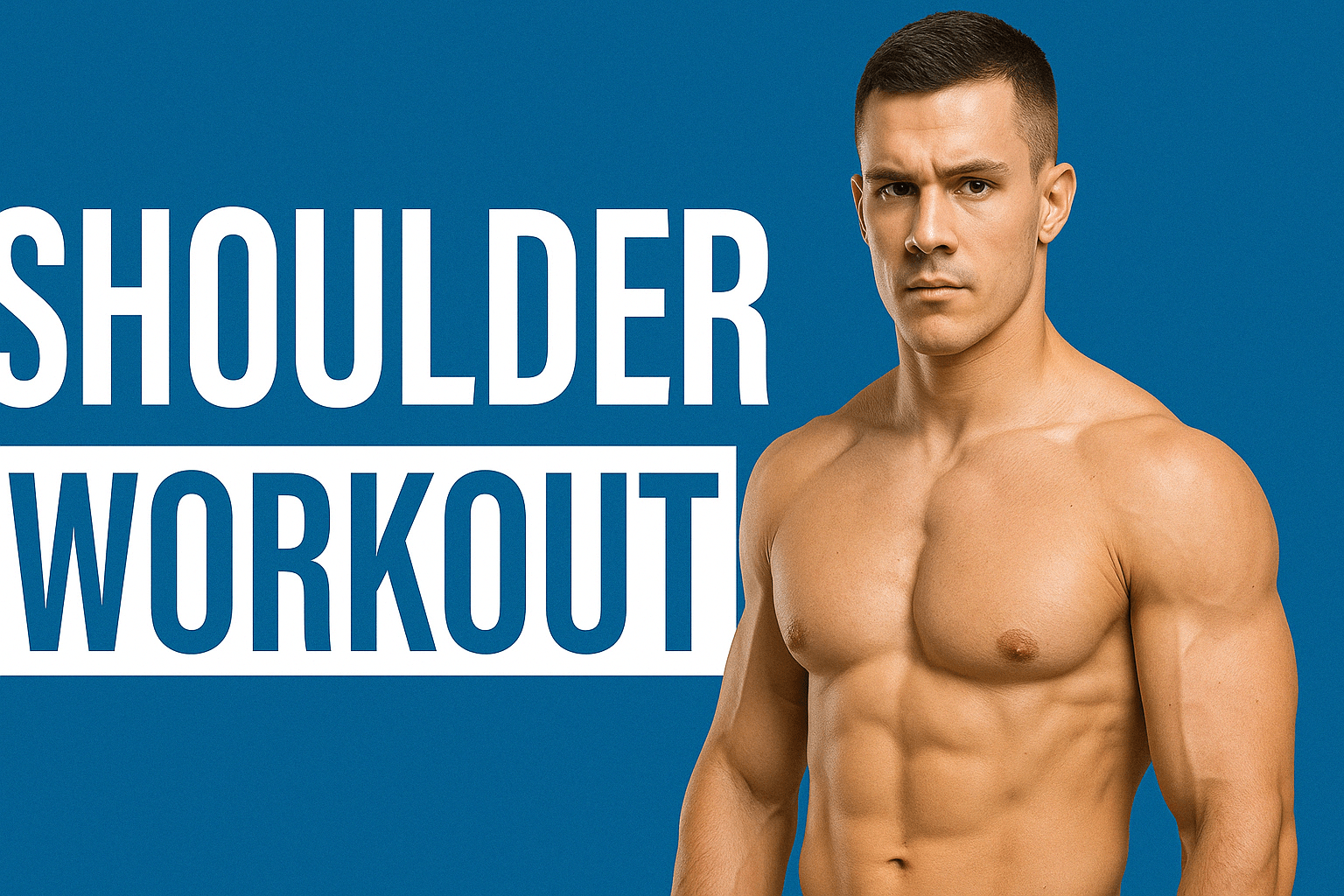Lateral Raise Introduction
The lateral raise is a popular shoulder exercise that mainly targets the side part of the deltoid muscle (lateral deltoid). It helps build broader, stronger shoulders and improves upper body posture and aesthetics. The movement involves lifting your arms out to the sides until they are at shoulder height, then lowering them back down — usually while holding dumbbells or resistance bands.

How To Do It ?
- Stand straight with a dumbbell in each hand, arms by your sides.
- Slightly bend your elbows.
-
Lift your arms out to the sides until they are parallel to the ground and aligned with your shoulders.
- Pause briefly, then lower them slowly.
You can also do lateral raises while sitting, using cables, or even with water bottles or resistance bands — making this a very versatile workout.
Can Lateral Raise Be Done at Home and in the Gym?
Absolutely! Lateral raises are versatile and can be done almost anywhere — at the gym, at home, or even in a small space.
- In the Gym: You have access to dumbbells, cables, and machines, which offer different levels of resistance and angles to train your shoulders more effectively.
- At Home: You can use dumbbells, resistance bands, or even household items like water bottles. The key is controlled movement and good form — not heavy weight.
Whether you’re just starting out or already experienced, lateral raises are a great addition to any workout routine. They’re simple but highly effective for shaping strong, round shoulders. So yes, with just a little space and any light resistance, lateral raises can be done anywhere, making them perfect for home and gym workouts.

Lateral Raise Workout at Home
You don’t need fancy gym equipment to build strong shoulders — you can easily do lateral raises at home using simple items like water bottles. This exercise targets the side of your shoulders (lateral deltoids) and helps you build wider, more defined shoulders over time.
Steps to do Lateral Raise
1. Prepare Your Weights
Grab two identical 1-litre or 2-litre water bottles. They work similarly to dumbbells by offering light resistance to help activate your muscles.
2. Stand in Position
Stand upright with your feet shoulder-width apart. Hold a bottle in each hand by your sides, palms facing your body.
3. Slightly Bend Your Elbows
Maintain a slight bend in your elbows during the entire movement to reduce joint strain and target the muscles effectively. This protects your joints and activates the right muscles.
4. Lift Your Arms to the Side
Slowly lift both arms out to the sides until they reach shoulder height, forming a straight line parallel to the ground. Do not swing or jerk.
5. Pause and Feel the Tension
Hold for 1–2 seconds at the top. Feel your shoulder muscles working.
6. Lower with Control
Gently lower your arms back to the starting position in a controlled motion to maintain tension on the muscles. This slow return builds strength.
7. Repeat
Do 3 sets of 12–15 reps with proper form.
✅ Extra Tips
-
✅ Engage your core and keep your back straight throughout the movement.
-
🪞 Use a mirror to monitor your form and correct any posture mistakes.
-
⚠️ Avoid lifting arms above shoulder height — going higher can put unnecessary strain on your neck.
-
🏋️♂️ Start with light weight (like small water bottles) and gradually increase resistance using heavier bottles or bags filled with rice or sand.
Lateral raises at home with water bottles are safe, effective, and require no gym — just consistency and good form!

Dumbbell Lateral Raise Workout at Gym
The dumbbell lateral raise is a classic shoulder isolation exercise that targets the lateral deltoid, helping you build broader, stronger shoulders. It’s a great move for shaping the side part of your shoulders and improving upper body proportions.
🏋️♂️ Step-by-Step Dumbbell Lateral Raise
1. Choose the Right Weight
Pick a pair of light dumbbells that you can lift with control.
It’s best to begin with light weights and concentrate on perfecting your form to avoid injury and build a solid foundation.
2. Stand in Position
Stand tall with your feet shoulder-width apart, holding a dumbbell in each hand at your sides.
Keep your arms at your sides with palms facing inward.
3. Keep a Slight Bend in Your Elbows
Your elbows should not be fully straight. A slight bend protects your joints and targets the delts more effectively.
4. Raise Your Arms to the Side
Slowly lift both arms out to the side until they are parallel to the floor.
Make sure your hands are aligned with your shoulders to maintain proper form and balance.
5. Pause at the Top
Pause at the top and hold the position for 1–2 seconds to engage and feel the tension in your shoulder muscles.
6. Lower Slowly
Lower the dumbbells slowly and with control back to the starting position to maximize muscle engagement and prevent injury.
Don’t drop them — control the movement.
7. Repeat
Complete 3 sets of 12–15 repetitions, resting for 30 to 60 seconds between each set to allow your muscles to recover.
✅ Tips for Better Results
- Keep your core tight and back straight.
- Avoid swinging or using momentum.
- Don’t lift above shoulder level.
- Perform the movement slowly and smoothly for better muscle activation.
The dumbbell lateral raise is simple but very effective for shoulder development when done with proper form.
Lateral Raise Workout Home vs Gym
The lateral raise is a great shoulder exercise that targets the side of your shoulders (lateral deltoids). You can do it both at home and in the gym — but each place has its own pros and cons. Let’s compare both to help you decide what works best for you.
🏠 Lateral Raise at Home
Equipment Used:
- Water bottles, resistance bands, or bags filled with rice/sand.
Pros:
- Convenient – You can do it anytime without traveling.
- Cost-free – No gym membership needed.
- Beginner-friendly – Light weight helps you learn form.
- Great for people who want to stay consistent in a small space.
Cons:
- Limited resistance – You can’t easily increase weight as you get stronger.
- Harder to target muscles fully without proper weights.
- You may need to be creative with household items for added resistance.
🏋️ Lateral Raise at the Gym
Equipment Used:
- Dumbbells, cables, or lateral raise machines.
Pros:
- Adjustable weights – You can easily increase resistance as you build strength.
- Better muscle activation – Dumbbells and machines offer a more stable and controlled movement.
- Professional form – Mirrors and trainers can help improve your posture and technique.
Cons:
- Time-consuming – Requires travel to the gym.
- May feel uncomfortable for beginners.
- Needs a gym membership, which might be costly.
✅ Which One Should You Choose?
If you’re just starting out or prefer working out in a quiet place, home lateral raises are a great choice. You can still grow and tone your shoulders using water bottles or resistance bands.
But if you want faster progress, heavier weights, and perfect form, gym lateral raises will give better results over time.
Final Tip: Start at home with good form, and later move to gym-based training if you want more strength and size. Both methods work — what matters is consistency and proper form.


One thought on “3 Lateral Raise Effective Workout: Build Shoulders at Home & Gym”